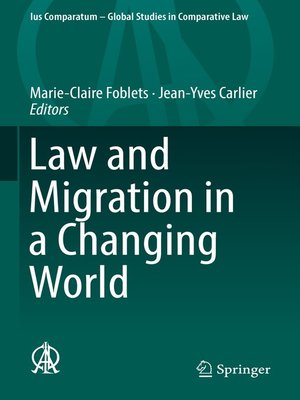Law and Migration in a Changing World
ebook ∣ Ius Comparatum--Global Studies in Comparative Law
By Marie-Claire Foblets

Sign up to save your library
With an OverDrive account, you can save your favorite libraries for at-a-glance information about availability. Find out more about OverDrive accounts.
Find this title in Libby, the library reading app by OverDrive.



Search for a digital library with this title
Title found at these libraries:
| Library Name | Distance |
|---|---|
| Loading... |
This volume comprises national reports on migration and migration law from 17 countries representing all continents. The vast majority of these are countries of immigration, which means they face specific challenges in terms of managing migratory flows that are increasingly linked with climate change and scarce natural resources worldwide, and they need to find viable ways to integrate humanitarian migration. Unlike so many recent publications in the field of international migration law, this book brings together reports on diverse countries that are rarely regarded as part of one and the same picture, depicting globalized migration in the contemporary era that to a large extent challenges state sovereignty. The contributions delineate the legal regimes that individual states are continually developing and modifying with a view to managing and controlling access of individual persons to their respective territories. They also show how the restrictive measures that states resort to in the event of failure to manage migration could have a lasting legal impact.
The General Report preceding the country reports provides a comparative overview of the national reports, and is divided into two parts. The first, more technical in nature, addresses the classic questions relating to admission to and residence in a country. The second, more reflective section, examines the relationship between laws and migration in a wider and multidisciplinary perspective. To allow a robust comparison, the country reports all follow a similarly wide-ranging structure; to the extent possible, they also cover the historical, sociological and demographic factors that help explain legal regimes and migratory flows in each country. Each country report includes analyses of recent legislative developments and delicate questions that are still awaiting adequate (legal) responses as well as perspectives for the future.







